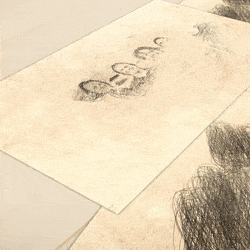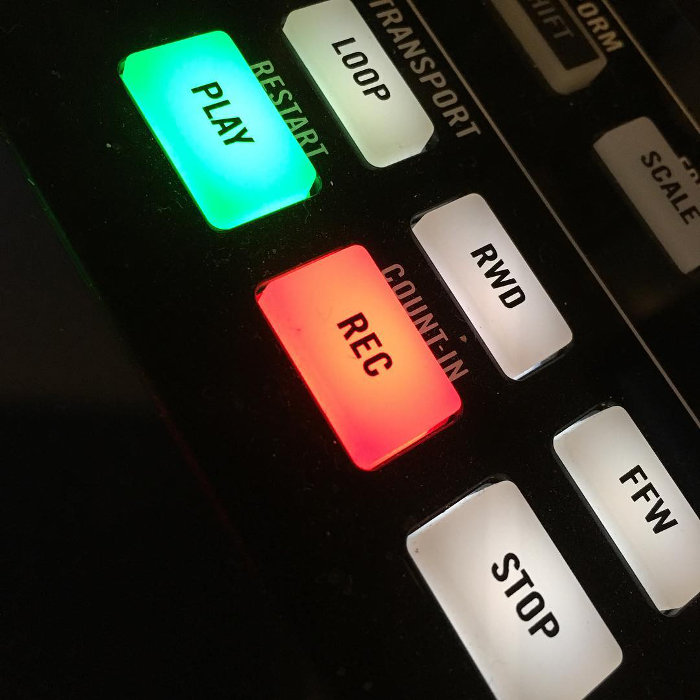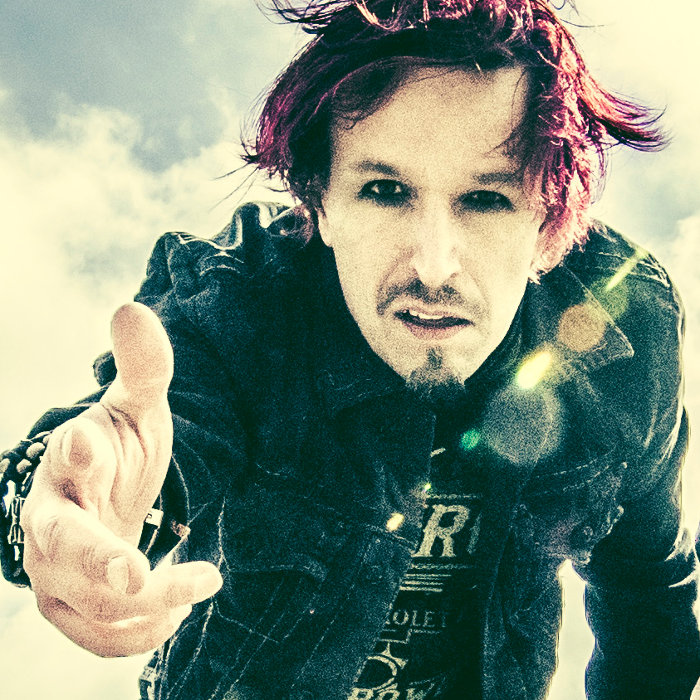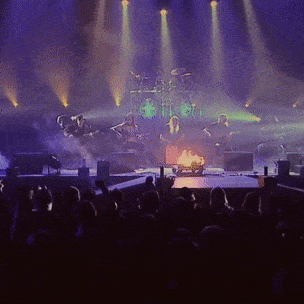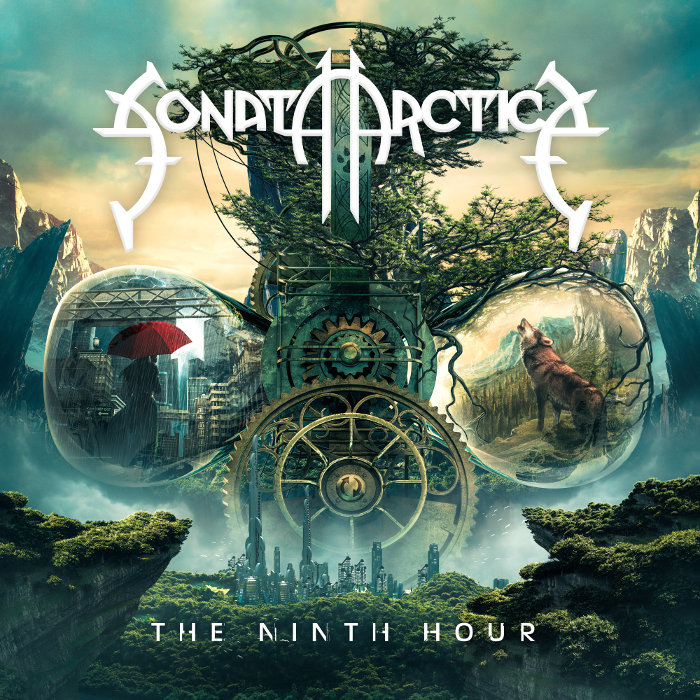Elise: Is the creative process different when you're working on an album like Winterheart's Guild, which is more of the "power metal" genre, than on an album like Unia or the Ninth Hour, which is more on "progressive" side?
Henrik: I don't think so. The way we always work is Tony write songs and make demos and presents them to the band and we take it from there. So I don't think the initial composition process has been any different. Of course whenever we start to work on new music and Tony starts to get songs together, it's always about how he feels at that time. And then we get the selection of songs and then we talk together "these might fit the album, these might not". But with this album we were supposed to start working on it earlier this year but we got the chance to tour with Nightwish so we wanted to go which actually made us to be in the position that when we came back from the stage we were in a hurry to get to the studio. So the band went to the studio and we only had two or three songs that we had heard on demos so we took those with us to start working and Tony stayed at home and composed some more songs and kept sending us tracks. It was really hectic and chaotic this time around. But if you get the chance to tour with Nightwish, you do it. They're so much fun to be around.
Guillaume: At the very beginning, did Tony give you more material than songs you eventually have on the album?
(Tony arrives)
Henrik: Not this time, no.
Tony: Nothing that would fit Sonata Arctica, actually. I have been working on solo project for a long long time already and it finally - after 15 years of slowly working on it – became a little more concrete. But this time I didn't have time to write any extra songs, I just wrote the bare minimum and that's it. That's usually what I do also. I may have one or two songs that I leave out from the album but generally speaking I just write the absolute needed amount of songs and leave the rest somewhere.
Guillaume: Traditionally, bands define their latest album as the best one they ever made. But in a recent interview, you talked about Unia and Winterheart's Guild as the albums you were most proud of...
Tony: ...Yeah maybe (laughs)
Henrik: ...on that day at least (laughs)
Guillaume: What do you think about your last three albums, compared to the first part of your discography?
Tony: I think it shows the band has matured a lot. We were really raw when we started. Ecliptica was like the extension of our demo, we didn't know what we were doing so that reflects on the album and makes kind of cute if you will. This feeling of danger and excitement, a sympathetic thing but we started evolving early on and the last three albums have been created and produced by a clearly more mature band. As it should be! We've been doing it for twenty years so if nothing changed or got better, in my opinion at least, it would be worrying. Especially when we are not a band like AC/DC who's expecting to do the...
Henrik: ...same thing.
Tony: "Same thing" sounds harsh but in a really tight formula.
Henrik: But I also think that when you start to compare albums it's a bit difficult because when we talk about the latest albums it's really fresh for us so to know where it's going to actually fit in the whole catalogue and the grand scheme of things it early to say. We need some space between making it and reflect on it. But also picking a favorite from the albums is like picking your favorite kid, it's impossible. All of our albums represent what we wanted to do at that time. Of course sometimes you don't agree with what you thought ten years ago.
Elise: Can you tell us what which songs are going to be released as singles next?
Henrik: We're going to release the next single next week: the song is "Life".
Tony: First single: first track, second single: second track. As if it was a well-planned thing ! (laughs)
Henrik: The following day from our show in Himos, in Finland, with Nightwish, we went to a location close by, in the middle of nowhere, and we shot the video. So the video and the single will be released.
Elise: Is it true that one song is the follow up of "Don't Say a word"?
Tony: Yeah, "Till Death's Done Us Apart". "The End of This Chapter", "Don't Say a word", "Caleb" and "Juliet" are all in that same basket of songs, if you will. It's not a continuous story, obviously, because those people would be zombies if they were still alive. (laughs) They have died so many times in so many different ways. It's like a theme. If they were in a ballad form I would call them "murder ballads", it's about human tragedies and jealousy stories.
Elise: And there is "White Pearl, Black Oceans Part II", as well. When you write those songs, do you think "oh I want to write follow ups"?
Tony: Absolutely not. It happens if it happens, basically. "White Pearl, Black Oceans" has this special place in the hearts of many Sonata Arctica fans: there are fan-fictions written around it and people have said "it should make a great movie", there are tattoos on people so it has never faded away and we have played it live as well. This idea has slowly developed to go back there also artistically, maybe write something to expend that story somehow, or continue it but at first I thought "continue what? They died!" (laughs) It's like on Titanic if Leonardo Dicaprio was suddenly swimming ashore. (laughs) But that happens here in this Part II. They are both alive. Of course a lot of other people have died. This is my personal Titanic. It was on April, I think, that I posted something on Instagram and said that I was working on "White Pearl, Black Oceans Part II" and immediately people started to comment "I want to hear that!" and I thought "good going, Tony, and now I have to really do it". But I did that on purpose to force me to get into it and get it done. I needed that kind of motivation and challenge also. I enjoy challenging myself and finding new ways to approach my work and this required it, in a way. I had to go back into a story that has a strong meaning for many people and I had to be up for it both musically and story-wise so it demanded a lot. I think pulled it off pretty ok. Mood wise it's much mellower than the first part but it continues directly where the first part left off and there's this thematic that continues as well. I think the whole thing binds together well. And maybe you have a happy ending there as well in the end, everything is fine. It's like going back in memory of that time when people go aboard that familiar ship and it crashes and a lot of people die except that one person who thinks it's partially his fault and everybody blames him for what happened and although it's not necessarily his fault, he drowns himself...but he doesn't drown.
Henrik: Happy ending!
Tony: I really look forward to fulfilling the plan that we have: one day we're going to play them both together. One long twenty minute song.
Henrik: We talked about it with the band and we're not going to do it straight away after the album's release because we want to give people time, to let it grow. When we toured with Reckoning Night, we didn't play "White Pearl, Black Oceans" in the beginning of the tour. When you make a big song like that it's good to give people time to get familiar with the song. And maybe for us as well.
Elise: We'd like to talk about a few topics that are tackled in the album. In "Candle Lawns", you talk about a "Purple Heart". Is it in reference to the war medal?
Tony: Yeah, absolutely. It's a story about friends that are so close they are practically brothers and they go fighting together and have the same career. Then one of them gets killed and he tells his friend to take care of his family for him.
Elise: War is a theme that comes back all the time in your lyrics...
Tony: Yes, well you hear about war constantly. But we're not Sabaton, so... (laughs). It's different, we don't glorify war, it's not my thing.
Elise: Is it from the fact that you were in the army for a brief period?
Tony: You basically have to go to the army or serve your country one way or another... or get a paper saying that you're nuts. (laughs) Or the civil service but that's one way of serving your country as well. I did my army time and learnt morse code. It was actually fun times, goofy. But it's not the reason why I write these stories, it's just one way of finding the tragedy, it inspires me.
Elise: There is another theme that one can find throughout your albums: heritage, fatherhood. Last time we spoke you didn't have kids but now that you do, how has it changed your inspiration on this topic?
Listen to their answers
Tony: I think the first time I changed in that area was "I Have a Right", obviously. It was really personal. Although I have a really beautiful friendship with my father so it's not a diary thing by any means. I actually told my father "This is not about you" thinking that he could take it awfully wrong. Gladly he's not really that good at English anyway so... (laughs) But the song mentions a "father" and it's told in the first person so it's more personal immediately. You play a role and you are the person there. That was when I became a father so of course it changes you. It's weird if it doesn't. It should. It's one of those really profound experiences that you have in your life. You're responsible for something so small and innocent and find totally new sides to yourself.
Henrik: I couldn't agree more. It changes everything.
Elise: Last time we spoke, you mentioned Bruce Springsteen when we talked about the lyrics of "Cloud Factory"...
(Tony & Henrik laugh)
Henrik: This is interesting...
Elise: Now, with "Candle Lawns", it made me think of Springsteen again and his song "The River", I don't know if you know it...
Tony: Yeah. I hadn't actually thought of that but maybe that is like... "Bruce Springsteen strikes back". (laughs) But yeah, you have that tone...
Elise: I thought he might have been an influence because as lyricists, you both are storytellers - as opposed to a more poetic kind of lyricist...
Tony: If we were an american band and if I had written that song twenty or thirty years ago, it might have an anthem that binds a generation of young people going to war together because there are such fates. Some people have lost their brothers in battle, it happens all the time of course. I'm pretty sure and I hope that song finds its place in the universe as a song that has an actual meaning for someone. It is not based on a true story but at the same time it is.
Guillaume: We found that the whole album has a sort of a "melancholic" atmosphere. It also seems softer than previous albums. Would you agree? Is the graveness of the lyrics a reason for this?
Henrik: I don't think so because the lyrics throughout the history of the band are quite melancholic...
Tony: ...Even when we were called "happy metal". (laughs)
Henrik: Yes exactly, it's always been that way. Most of our albums have some dark undertones. Maybe the early ones were more upbeat and happy but, still, we've been into these dark moods...
Tony: This album is more serene, more melodic in a way. It makes you feel that it's somehow sadder. Of course, some of the themes are... hopefully desperate... (laughs)
Henrik: ... or desperately hopeful? (laughs)
Tony: We're not preaching or anything, it's just observing and wondering the world "why? What can we do?", It's one of those fundamental questions. One person can change and do things but as a race, as humanity, I think we are in deep shit. (laughs)
Guillaume: At the beginning of the interview you said you were more mature, do you think it can be heard in the lyrics and the music and maybe that would be the reason why this album is softer than your previous albums?
Tony: In the lyrics, yes absolutely. I think I pay more attention to the lyrics, they are of importance to me. Earlier in our career, although I put a lot of thought in them, I had this weird idea that nobody listened to them anyway and they were just something that I needed to have to be able to sing the songs. But of course I wanted to entertain myself and have stories to tell people and, as time went by, I've also grown more ambitious. I want to tell better stories and touch people in different ways and do it again and again. It's a challenge, too: how many love songs can you write? Maybe only one billion. (laughs) So you have to find a fresh angle which is not a rip off from something famous and already copied a million times. It's the challenge. I think the fact that I've given myself a chance to grow as a musician and a writer shows some maturity. At least I'd like to think so.
Henrik: I think we are a lot better at what we do, as a whole. We say we're getting better but of course, for some people, we're just getting old and obsolete. (laughs).
Tony: There's always a downside in getting older and more experienced. There is a lot of freshness and appeal to the fact that young guys just go and grab a Redbull and do crazy stuff like we did on the first album. But in the first album we were all over the place and eventually, as time goes by, you get your act together. In the grand scheme of things, we are getting bigger and better and more professional but it's losing that crazy aspect, in a way. But it's still a good thing. You know, those early albums are not going anywhere, they are here forever so if you want to hear the rumbling things and craziness, go and do that but we need to find new ways and we want to get better and not get stuck something that we've been doing for 20 years.
Elise: The live shows are good for that because you have a little bit of everything.
Henrik: Exactly.
Guillaume: I was in Himos for your concert, opening for Nightwish...
Tony & Henrik: You were? Cool!
Guillaume: I found the landscape was really beautiful and participated to the intimate atmosphere of your acoustic show...
Tony: Sorry it was all in Finnish (laughs)
Guillaume: Did you feel particular emotions in that special setting?
Henrik: We've done six or seven acoustic shows this summer and every time it's a bit special because we are not really comfortable with the acoustic setting, so it's a bit scary. Every time you go on stage, it feels like you go onstage for the first time. That adds to the excitement: this feeling of danger and not knowing what is going to happen next. We also have a friend of ours, Masi, who is playing extra guitar, so it was really exciting and challenging for the whole band to do something so drastically different. You just have to have faith that it will work and just jump into it. And somehow, everything magically falls into place. Each acoustic show is something really special for us.
Tony: For me, it was more "as long as you guys get your act together..." (laughs)
Henrik: (laughs) Exactly! Just hoping we can do it!
Tony: I can just more or less enjoy the ride. Those shows are easier for me, I have more room with my vocals. It's more laid back and I can do things so much differently than with a normal full blown Sonata Arctica show. I don't have to scream my lungs out, it would sound stupid if I did. So I love these acoustic shows. For a singer it gives a certain amount of freedom and breathing space.
Guillaume: Will you play acoustic concerts only at the summer festivals or do you plan on including an acoustic part in the concerts of the upcoming tour?
Tony: There are some logistics problems when you tour on an acoustic set because you need to bring some extra gear. Of course, in Europe it might be possible...
Henrik: We did that a few years ago.
Guillaume: Yes, at some point during the shows you were in circle in the middle of the stage around a firecamp...
Tony: Yeah. At this point we don't have that planned, we're concentrating on a normal show. But in the future, when we come back touring later next year or in 2018, and we need to renew our set that might be one thing to do. But we also thought it would be fun if it was somehow possible to go on an acoustic tour with full 90 minute sets. But I think we should first get something released as an advertisement of that tour. Maybe a greatest hits in acoustic form so people can actually check out and say "oh, this is actually really nice"... or crappy. (laughs) I think that a lot of people who like Sonata Arctica know that these songs come up totally differently in acoustic form. People then realize that it is not only about speed and extra stuff. When you strip down the songs to the bare minimum, it's still the same songs, it actually works. But we definitely need to do some kind of release to allow us to go on such a tour.
Henrik: We've been talking a lot about that with the band because it was so exciting to do these shows that there is no chance in hell we won't do it again. We just have to figure out the way to experience it again. We will be back with these scary acoustic shows at some point. (laughs) But for now, we're going to focus on the new album and play electric shows.
Guillaume: Just to go back to the Himos show, can you tell us more about Masi?
Tony: His name is Masi Hukari. As a musician, I think he's best known for Amoral. He's a fantastically talented guy, extremely smart and he'd probably be pissed when I say that... He's a fantastic guitar player, obviously, and he plays other instruments as well so he's a fantastic addition. It's something we could have use for in the future acoustic sets because he plays the cello and the flute...he's our version of Troy! If only he sang!
Henrik: We've been working with him for years. He's been working as a drum tech for us, he's been around the band a lot, he's a useful guy, he can do a lot of stuff so whenever we are in a panic he can help.
Tony: A great friend.
Guillaume: Have you already identified some songs from the new album that you'll be sure to play during the tour?
Tony: "Closer to an Animal", "Life", "Fairytale", "We Are What We Are", "Among the Shooting Stars", at least.
Henrik: So that's decided, then. (laughs) And at some point, as I said, we are going to play "White Pearl, Black Oceans Part II" as well.
Tony: But, you know, when we go on tour we are also digging up old songs that we haven't played in a long time. Sonata Arctica fans may have noticed that we played "The Power of One" in one of the festival shows and that will also happen in the future. And we also would like to go back to the Winterheart's Guild album to play some songs that haven't been played in decades.
Guillaume: More and more European bands, including Sonata Arctica or Nightwish plan twice as many concerts in their North American tour as in their European tour. How can you explain it?
Tony: It's really expensive to go over there and it's takes longer so, when you've paid all the expenses, and you want to have a payday you need to have more shows. While you go there, you might as well stay there as long as possible.
Henrik: On that note, we're doing a short European tour now since we had the shows already booked and the album will come out later than we initially thought, but we will come back in spring and tour for two months so all in all it's about the same amount of shows than in the States.
Tony: We'll come back in France as well. Not in Paris, unfortunately...
Henrik: But I noticed that as well but we will rectify it and make it right and we will play in Europe more.
Tony: North America is a big big place. Plus, we enjoy touring there as well. If it was shit, we wouldn't go at all. (laughs)
Guillaume: Do you know which bands will open for you?
Henrik: On the first European tour, it's going to be Twilight Force. In the States we have Omnium Gatherum and Leave's Eyes. For the spring, we're still working on it.
Elise: You've toured with Nightwish again, what do you learn from touring with other bands?
Tony: The value of friendship would be one thing. Because you can go on tour with some bands that treat you like shit and Nightwish is not one of those bands.
(Tony has to leave to another interview)
Henrik: When you watch other bands on tour, they have problems that we don't have. Sometimes they don't get along at all. You see that from the side and you wonder why they do it at all when it's so horrible. We've been very lucky to tour with Nightwish three times and we've seen them with all their singers. The first time we supported them it was with Once in 2004, so with Tarja, then 2008, the Dark Passion Play tour with Anette and now with Floor! I've seen close to a hundred shows of Nightwish without making the effort to go somewhere, just by showing up at work! The way Nightwish work is really well thought out, it's a pleasure to see that and it's something to strive for.
Elise: Let's go back to the album and its artwork. It shows three bubbles: one image of utopia, one of dystopia and one that represents the balance between the two. Where do you think the world we live in right now is at?
Henrik: (laughs) Where it's at? Well, it's easier, I thought you were going to ask where it's going to go...
Elise: You can answer that as well!
Henrik: No I can't, it's impossible. (laughs) I think we live in really interesting times. A lot of bad things are happening, a lot of good things are happening. I think that humanity is at a place where we are waiting for something new, a new age, on some level. I'm really curious to see what that would be and I hope it will happen when I'm still around. The way of thinking and the way of being we've been using for years is coming to an end and we have to find a new way to justify our existence. We have to get along and somehow reach the next level. But the path Humanity has taken is coming to an end, one way or another...I don't want to sound too gloomy or suicidal but for me that's a fact.
Elise: To conclude this interview, do you have any recommendations for our readers? What have you been listening to, read or seen lately?
Henrik: There's a really fun new band in Finland called Humavoid. Technical progressive death metal, something like that. It's one thing I've been checking out lately, it's totally different from what I've heard before. I don't know if I like it or not yet. (laughs) And you have these young bands which have been around for awhile: Santa Cruz and Lost Society. They are the new Finnish wave of metal. Battle Beast, of course. Those are the ones that I'm listening to now. It's always interesting to see what comes next to challenge us old geezers. (laughs)
■


 Vous pouvez également lire notre interview en français
Vous pouvez également lire notre interview en français